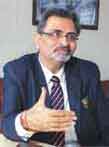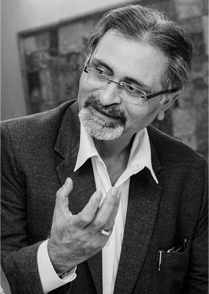A heartfelt conversation with Devesh Mukhija, Director and Country Head at Warren & Brown Technologies, who took the company to soaring heights in India, and his entrepreneur wife Anjali, who heads a consultancy with a focus on financial markets. Together they are the Conquering Couple...

Devesh Mukhija is no stranger to success. A veteran of the telecom industry, he has witnessed India’s transformation from a telecom novice to the juggernaut it has become today. As the India head of Australian company Warren & Brown-renowned for innovation in optical fibre termination and precision tools manufacturing, Devesh has taken it to great heights in India and beyond. His wife Anjali, too, is a stalwart in her own right. A seasoned veteran of the financial services industry, she is the President–Consultant of SecMark Consultancy Pvt Ltd. Despite their remarkable success, both Devesh and Anjali are down to earth and approachable individuals. And just like their careers, the story of their marriage is a tale worth telling.
The most extraordinary things in life often have traditional beginnings. Such is the story of Anjali and Devesh Mukhija, who first met in the most conventional traditional way-through a matrimonial ad. Anjali had just completed her education and was on the lookout for a job. She vividly remembers the time she met him. For a young independent woman with her whole future ahead of her, it was extremely important for her to understand Devesh’s views on life. Her expectation from marriage was simple, yet profound. She felt that after marriage, her husband should not only become a girl’s life partner, but also her best friend. She had always wanted to find a friend in her life partner and on the day of Dussehra in 1994, her search was over. Ever since, there has been no looking back.
Devesh is unequivocally appreciative about Anjali. “She is my pillar of strength,” he says. Devesh has seen a phenomenal rise to the top of the corporate ladder, but with any staggering success, come numerous challenges and pitfalls. Sometimes, according to Devesh, it becomes impossible to see the light at the end of the tunnel. “It is Anjali who helps me remain optimistic during such times. She is an immensely positive person, and she keeps me motivated and focused.” Devesh is very emphatic that he wouldn’t have been able to reach the dizzying heights of corporate success without Anjali by his side. If Anjali thinks of Devesh as her best friend, Devesh calls Anjali his friend, philosopher and guide.
Even after two decades of marriage, Anjali feels that Devesh’s appeal remains the same to her. Even after a hectic day at office, he never forgets to pamper her, the way he did when they first met. Devesh still writes her love notes, a rarity in today's technological world. It’s these simple things that count the most, says Anjali. It’s not the expensive gifts or jewellery that matter to her. The beauty is in the thoughtful things he does, like getting her a rose, singing a song, or dancing with her on their favourite tunes. “Devesh knows how to bring a smile on my face,” she says.
When asked what it takes to have a successful marriage in an age where relationships are not as strong as they used to be, both Devesh and Anjali stress that trust is the most important factor in a successful marriage, when both partners are professionals. According to them, trust is the building block of their relationship, and with time and a little understanding, the trust and the relationship both get stronger.
Parenting is often a full time task, and for Anjali and Devesh, their two daughters-Namrata and Simran-are their priority. Managing children and work can be daunting at times, and Anjali feels fortunate for the support she gets from Devesh and his family. Anjali and Devesh ensure that no matter how busy they are they find the time to have dinner together as a family. As the saying goes, the family that eats together stays together. Anjali believes that children should be raised to be independent people, and most importantly good human beings.
It’s not the expensive gifts or jewellery that matter to Anjali. The beauty is in the thoughtful things Devesh does, like getting her a rose, singing a song, or dancing with her on their favourite tunes. Devesh knows how to bring a smile on her face

We met in a very typically set up of an arranged marriage through a matrimonial advertisement in a leading newspaper. Our families got introduced first on coming across the advertisement. I had completed my education and was pursuing a job. We met on the Dussehra festival day in 1994. Before agreeing to the proposal, I met him in person to understand his views on life. I always wanted to spend my life with a friend. I feel, after a girl gets married, her husband becomes not only her life partner, but also the best friend. He is the first one to whom she addresses for any joys or sorrows.
I think he is a very simple and understanding person. He has always supported me through good and bad times. Be it my career move or any other personal or professional decision, he has given me independence and has been my counsellor, guide and friend throughout. He pampers me a lot. In my view, pampering does not only include buying gifts. It can be small little gestures like writing a love note, getting a rose, surprising with cupcakes, singing a song, dancing to the tunes of my favourite song with me, sending cute text messages, or anything else that will bring a smile on my face.
He has a very good sense of humour. Humour gives the relationship a new dimension and keeps it fresh and healthy. Relationships are about learning from each other. You become a better person as you spend time with your spouse. It does not mean you change all together as a person, it means improving a little every day.
Most importantly, we trust each other. I feel trust is the building block of a relationship. The stronger the trust gets, the stronger gets the relationship.

Yes, it is quite hectic, especially the weekdays. We are in constant touch with each other during the day. We ensure that before the day ends, we spend time with each other every day. Even when we are travelling, we connect to each other sometimes through face time and share our experiences of the day.
During weekends, we avoid outstation travel for official purposes and accompany each other wherever possible, so that we can spend most of the time together. Official meetings are avoided by both of us over the weekends, if there is no urgent requirement. We go the temple (Hanuman Mandir, Connaught Place) every Sunday evening to perform puja. We are both devotees of Lord Hanuman.
On special occasions, we go for lunches or dinners together. We both love to travel so we take short breaks from work to go places nearby Delhi like Agra, Jaipur, Chandigarh and so on.
Our elder daughter Namrata studies at the Netaji Subhas Institute of Technology, Dwarka, New Delhi. She is pursuing 3rd year of her BE (IT). The younger one, Simran, is pursuing B Tech (ECE). She is in the 2nd year class at Jaypee Institute of Information Technology, Noida.
Both daughters have an age gap of about one year. Managing children and work was quite challenging at times. But what worked for me was the constant support from my mother, mother-in-law and Devesh. Each age has its own challenges. My children were very understanding and cooperative and have always encouraged me whenever required. They are very intelligent and have made us proud always. I keep some time each day exclusively for them late in the evenings and spend time with them during family outings. I tried to make an extra effort to be with them in case they were unwell or times when they needed me the most. The entire family has dinner together every day and shares thoughts with each other. On weekends, we play games like cards, carrom, ludo and so on. I have always encouraged them to develop skills that will make them independent and good human beings. My daughters feel proud that their parents are high up on the corporate ladder.

She is very sensible, independent and is capable of handling adverse situations in life with her admirable patience levels. She has been a friend, philosopher and a guide. Moreover, she has above-par knowledge in her field and keeps me encouraged and focused every day.
When I was transitioning from Mekaster Telecom to Krone Communications or to Warren & Brown, she gave me the strength. She has supported me throughout my journey up the corporate ladder, and has been immensely encouraging at all times. Fortunately, there hasn’t been a rock bottom situation in my career life, but there have been numerous challenging days where seeing the light at the end of tunnel was almost impossible. Anjali helps me to stay optimistic during these times. Moreover, highs are only highs when you have someone to share the celebration with. She has been an amicable companion through thick and thin.
Building something from scratch is no walk in the park. Ask Devesh Mukhija, Director and Country Head at Warren & Brown Technologies, who helped establish and build the Australian company in India from the ground up. A man who wears many hats, Devesh has a bird’s eye view of the telecom revolution happening in India. Corporate Citizen meets the stellar corporate honcho for a chat on his journey to the peak of success, his view on India’s digital revolution, and his advice on how youngsters should grab every available opportunity they get.

I completed my B E (Electronics) from MIT Aurangabad in 1991. Further, I ventured into teaching in the same college for a year. After that brief stint with academia, I went for a graduate training engineering in Haryana Telecom for one year. Post that, I moved to Mekaster Telematics as Assistant Manager-Sales and I worked there for six years. Next, I joined a German company, Krone Communications and worked there from 1998 to 2007.
In 2007, I started working at Warren & Brown, and was the first employee to be hired for India and SAARC. I joined in July, and got the company incorporated in November. We are focusing only on telecom operators and Original Equipment Manufacturers (OEMs). In the last nine years, we have managed to cover almost all of the major operators, as well as big OEMs like Huawei and Ericsson.
We provide optical fibre termination equipment to our customers. Fibre optic cables are essential for high speed data. Reliance Communication has been our customer even before the company was incorporated in India, through our Australian head office. Apart from this, we also provide yellow ducts to safeguard all the fibre patch cords inside the telephone exchange. With the usage of this product, the losses in fibre communication are reduced drastically thereby improving the communication data. It also improves the aesthetics of the exchange. We supply our products globally; Telstra and National Broadband Network are major customers for all the fibre accessories / products in Australia. We have also developed some new products like Hybrid cables and Wifi solutions for FTTH last mile connectivity etc.

I joined as a Regional Sales Manager for India and SAARC. After two years, I was promoted to Country Head. In October 2014, I joined the board as a Director.
There have been innumerable policy decisions under my umbrella. However, to start with, the ones that have made all the difference were during the period of inception as we started from scratch in India. Our first major achievement was with companies like Bharti Airtel, Ericsson and Aircel. All of this exponentially increased the growth of the company in India. Another important decision was whether to start with manufacturing of products or distribution of our products manufactured worldwide. Based on my analysis of the market, we chose distribution over manufacturing and that has completely changed the dynamics of our business in India.
Yes. However, the backbone of this revolution, which also forms the essential binding and brings internet to the table of a common man, is Telecom. We are a country of 1.25 billion people, out of which 1.05 billion people are cell phone users. Telecom will cease to be 'just' telecom. Earlier, telecom used to be a service, and now it has become an ITES (IT Enabled Services). A civil engineer will use it, so will doctors and so will businessmen. Telecom is now much more integrated and spans almost all fields of work. From the perspective of a telecom operator, it will be value added services. Data will drive everything. Devices with high capacity and storage have already been rolling out in the market, and there is much more to come as users are accessing, consuming and demanding more data every day.

Yes, though India is still very far behind, with the 4G revolution happening, there is immense scope in the future. If the opportunity is capitalised properly, we can certainly catch up.
Personal and professional lives are two ends of a see-saw and striking a balance between the two is an arduous task. However, meditation and yoga have helped me battle every day challenges with a peaceful mind. Moreover, having clear priorities with a stringent yet accommodating schedule, the task becomes somewhat lighter.
Thanks to my family, it is possible. They give me the time and space for my job, and they have been extremely patient with me. They support me wholeheartedly, which to me is very important. I try to manage my time the best I can. When I am with family, I try to give them 100 per cent attention. Similarly, when I am at work, I put in 100 per cent effort. I don’t believe in dividing attention.
I like watching comedy shows or some religious or spiritual shows. I feel if you are able to lighten yourself, and your ambience, you automatically feel much better.
In IT and telecom, women have been emerging. More than 15-20 per cent of employees in the offices are women, and not just at the executive level but at the senior level as well. However, of course much more needs to be done. We definitely need many more women representatives in all industries. Companies are realising this and are also taking measures to increase the percentage of women employees in their workforce. I am optimistic about the future.
When I am with family, I try to give them 100 per cent attention. Similarly, when I am at work, I put in 100 per cent effort. I don’t believe in dividing attention
Balancing work/life and seizing each opportunity with hard work and sincerity always yields the best outcomes. One should always look for motivation from the inside, and that'll help you overcome the numerous obstacles faced on the rocky road to success. With a profusion of opportunities coming up in the manufacturing and ITES sector, I would wish every student all the success, and may they succeed in every endeavour.
Anjali Mukhija is no stranger to change. She started her career in 1995 with the National Stock Exchange of India as an Assistant Manager, and for a decade has seen the ebbs and flows of the Indian economy up close. Since then, she has made a stellar career in the securities and commodities market, and is currently the President-Consultant at SecMark Consultancy Pvt Ltd. Anjali sits down with Corporate Citizen for a riveting chat on leadership, the stock market and the prospects of the Indian economy in the near future
I have about 21 years of experience in Risk, Compliance/ Stock Exchange Operations & Broking/wealth management operations. I completed my education with Masters in Mathematics from Delhi University and Management from YMCA in 1994. I started my career with the inception of National Stock Exchange at Delhi. During my journey at the exchange for 10 years, I gained experience of the exchange related activities/operations and regulated Trading Members and sub brokers across Northern India. I have also been involved in training large audiences on topics concerning Capital Markets towards popularisation and marketing besides being instrumental in handling SEBI initiative for Investor education at various locations in North India. I moved on to various Wealth Advisory Corporate viz. RR Group, Unicon Financial and Fullerton Securities and Wealth Advisors for next eight years as Vice President-Risk and Compliance. During my tenure at Unicon, I was assigned responsibility for Legal Department. This inspired me to pursue law degree from Jiwaji University, Gwalior.

Recently, I have started my own consultancy and have been for the past four years, in partnership with Secmark Consultants, Mumbai, providing consultancy in the area of financial markets. The customers include Wealth Advisors, stockbrokers, Depository Participants, banks and insurance companies.
Additionally, I am a trainer with CPE (Continuing Professional Education) with National Institute of Securities Market (NISM) for various certification courses in financial markets. Also, I am a visiting faculty at various institutes providing education in financial markets viz. Equity Derivatives, Financial Planning, Secondary Markets etc.
There are 3 skills that are imperative for an employee.
1) Speed of execution—For example, Reliance Jio has recently been launched. There are established players in the market, but the speed at which Jio launched its plans and captured the market has left the competition in a lurch. Quickness to act is a very important skill.
2) Technical expertise—Whether you are an HR, IT professional or a marketer, your technical expertise is invaluable. What I have observed is that young professionals often do not learn the nitty gritties of the job. Take your time and get the expertise in whatever you do.
3) Ownership and Accountability—I can tell you countless examples of people not taking accountability and ownership. Kingfisher Airlines is a prime example. Not taking ownership destroys the reputation of the company. Recently, the lenders of Kingfisher Airlines tried to auction their logo but there were no takers. Even one of the banks, while granting the loan, had valued the logo at 234 crores, which was clearly an overvaluation.

Apart from skills I mentioned as a general employee, the leader needs to have some special skills such as :
1) Multi-fold Approach—Looking at a project from different angles. It good be a new business initiative, risk management, or a global approach
2) Flexibility—A leader should be able to work in any kind of environment. You have to work according to the strengths and weaknesses of your team.
3) Go Local Approach—Let’s take the example of rural India. A company cannot have the same approach there as they do in urban India. They need to think and act according to local needs and sensibilities.
There are guidelines laid down by the Securities and Exchange Board of India (SEBI) required in order to be eligible for an IPO, and at the moment the companies you mentioned do not fall into the required criteria. However, going forward, these companies may be eligible for an IPO. We can wait and watch for developments as they come.
When I joined the National Stock Exchange in 1995, there were no women there. There is a patriarchal mindset in India that women don’t invest in the stock market. Even my mother advised me to use spare money to buy gold
When I joined the National Stock Exchange in 1995, there were no women there. There is a patriarchal mindset in India that women don’t invest in the stock market. Even my mother advises me to use spare money to buy gold. We were buying an apartment 20 years back, and I told my mother that since I am short of money, let me sell my gold and invest in the flat. She objected passionately. It’s the mindset. Besides, many people don’t understand what the commodities market is all about. It is very difficult to convince them that the stock market gives returns. I have conducted investment seminars with SEBI, and observed that people were not happy investing in equities. They did not have the confidence. They are scared that their money will be swallowed up. If people can be convinced about the safety of investing in the stock market, and the higher returns they can get, I’m sure they will come around and be much more enthusiastic about the topic.
I expect the market to do very well, because the economy is doing well. The GDP is at 7.8, even after demonetisation, which is extremely positive. With Indian companies like TCS and HCL now going international, and with the innovations and future prospects of these companies, I see India going far ahead from where we are today.
The global market definitely has an effect on the Indian market, but the impact is limited. It lasts for a day or two. Ultimately, it is the domestic market, which makes maximum impact. There are certain industries that depend on the international market, and the linked impact is felt in those industries. When Nasdaq falls, Nifty falls too, but it bounces back soon. Domestically we are doing quite good, and I see that trend continuing unless the government suddenly makes any radical changes in its policies
by Neeraj Varty